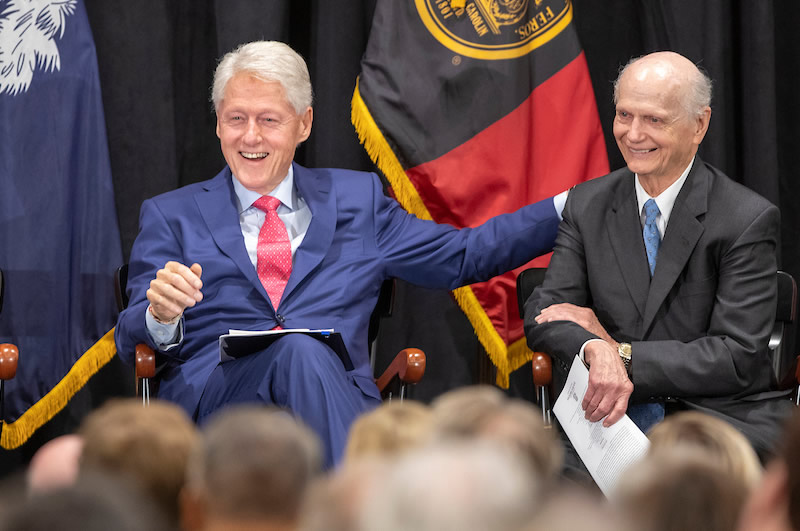By Andy Brack, editor and publisher | Good old-fashioned decency in political discourse is a rarity in these times of electronic and highly-partisan discontent.
 But good old-fashioned decency was on full display Aug. 6 in Columbia as the University of South Carolina commemorated the life and work of former Gov. and U.S. Secretary of Education Dick Riley during the official opening of his political collection. Part of it is now on public exhibition in the Ernest F. Hollings Special Collections Library and includes thousands of photographs, speeches, notes and more that give insights into Riley, a quiet lion of a leader.
But good old-fashioned decency was on full display Aug. 6 in Columbia as the University of South Carolina commemorated the life and work of former Gov. and U.S. Secretary of Education Dick Riley during the official opening of his political collection. Part of it is now on public exhibition in the Ernest F. Hollings Special Collections Library and includes thousands of photographs, speeches, notes and more that give insights into Riley, a quiet lion of a leader.
“Politics can be a wonderful thing and it can be an unpleasant thing,” Riley, now 85, told a crowd of more than 600 people gathered to honor him. “But I hope they will see in this exhibit, which will be a tremendous exhibit, that you can be a politician and be into issues and not bringing people down.”
Former President Bill Clinton tapped Riley to serve as his secretary of education in 1993 because of his success in moving South Carolina forward in education in the early 1980s. Riley and a dedicated band of supporters pushed through passage of the Education Improvement Act, which boosted teacher pay, improved accountability and pumped billions of dollars into public education over the last three decades.
Clinton wanted a change-maker like Riley to target education nationally.
“I believed that the future of the country depended upon our ability to educate everyone,” he said. “And I knew that he believed that ability is evenly distributed, but opportunity is not.”
The key to Riley’s long, effective leadership has been his decency and how he treats everyone, even those with whom he disagrees, as individuals, not enemies.
“When we give that up, we have given up everything that makes democracy possible,” the president said.
Clinton said Riley, one of the most widely-regarded and successful Cabinet officials of the 20th century, made good leadership look easy.
“Always had a smile on his face, always treating people like they were people.”
Riley, who declined an offer by Clinton to serve on the U.S. Supreme Court because he wanted to keep focusing on education, continues to push for education improvements. After serving eight years as education secretary, he returned to South Carolina and founded the Riley Institute at Furman University, which focuses on programs to improve schools, expand diversity and develop more principled leaders.
Riley said South Carolina leaders needed to renew a commitment to excellence in public education.
“The money we spend on K-12 [education] is low, obviously, in comparison with other states. It’s important to have a focus on trying to enhance that amount, but it’s important also, when you do that, to support interesting things like how, in a conservative way, do you operate schools, do you handle the administration of schools?” he said.
“The EIA was really a radical thing in its time. It was a movement, and I think we need another movement. I would like to see that right now.”
The still-active former governor also urged people to work together as a village, a nod to Hillary Clinton’s book, “It Takes A Village.”
“We all must continue to dream. And to work as a village together,” he said in closing remarks. “Work, remember this, for the public good. That says an awful lot.
“If all of us work for the public good, we’ll move in the right direction. I am absolutely convinced of that. Working toward peace, towards a happy, meaningful, healthy, safe life for everyone – and certainly a high-quality education for every single child and every adult in South Carolina and in Arkansas and throughout this great nation of ours.”
South Carolina and the nation need more leaders like Dick Riley today – Democrats, Republicans and independents who calmly collaborate, talk, share ideas, explore possibilities and work for lasting change to help everyone. In short, we need more people to be decent and act in the public interest. What we don’t need are more elected officials who operate in the safety of shadows, furtively punching mobile phones in the wee hours of the night.
- Have a comment? Send to: editor@charlestoncurrents.com




 We Can Do Better, South Carolina!
We Can Do Better, South Carolina!
























